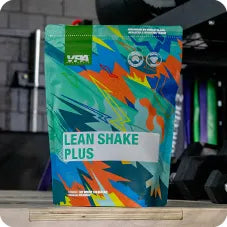Your Cart is Empty
Electrolytes for Training
April 10, 2019 3 min read

Often people ask me about what they should and shouldn’t be drinking Electrolytes for Training. Recently I set myself a goal of doing an endurance run. I have never been a long distance runner as it is definitely not my strongest point. So I set myself a goal and decided to undertake a half marathon - yep a crazy 21km run!
I started my prep by speaking with a few different people from training backgrounds about prepping, they gave me lots of mixed reviews whether I should be drinking “sports drinks” (no names will be labelled in this article), add salt to water, only drink water, don’t use mixed powders. That’s when I decided it was time to open up the textbooks and do some serious reading.
Water makes up a significant proportion of a person’s body mass
Approximately 45-70% of water but this ranges between individuals. This water contains a sizeable amount of electrolytes. For example, adipose tissue has a low water content (10%) and lean tissue such as muscle a high water content (76%), so the total fraction of water in the body is determined largely by the total fat content*. The water within out bodies are not present as plain water, they contain a wide range of electrolytes and solutes, they are dissolved in varying concentration in body fluids. The major cations (these are the positively charged electrolytes) in the body are sodium, potassium, calcium and magnesium; the major anions (the negatively charged electrolytes) are chloride and bicarbonate.
The location of electrolytes in the body water is not consistent throughout the body compartments. It is critical for the body to maintain the distribution of electrolytes because maintenance of the trans-membrane electrical and chemical gradients is of paramount importance for ensuring the integrity of cell function and allowing electrical communication throughout the body*.
Effects of changes in hydration during exercise are diverse. This diversity ranges depending on the sport and exercise training and competition, including intensity, duration, frequency and environmental conditions. Which means that providing specific recommendations in terms of drink volumes and compositions and patterns of ingestion is not sensible. The American College of Sports Medicine (ACSM) current stand on exercise and fluid replacement highlights this and concludes that the goal of drinking during exercise should be to prevent excessive (>2%) body mass loss due to a water deficit and to prevent excessive changes in electrolyte balance. ACSM state that because the considerable variability in sweating rates and sweat electrolyte content between individuals, customised fluid replacement regimens are recommended to all.
Post exercise re-hydration is just as important as during
The primary factors influencing post exercise are the volume and composition of the fluid consumed and the rate with which it is absorbed by the body. The volume will be influenced by many factors including the palatability of the drink and its effects on the thirst mechanism, although with conscious effort some people can still drink large quantities of an unpalatable drink when they are not thirsty*.
Beverage consumption during exercise and post exercise
Plain water is not the ideal post-exercise re-hydration beverage when rapid and complete restoration of fluid balance is necessary and where all intakes are in liquid form. This was determined through scientific research showing there was a high urine flow following the ingestion of large volumes of electrolyte free drinks did not allow subjects to remain in positive fluid balance for more than a very short time. These studies also determined that the plasma volume was better maintained when electrolytes were present in the fluid ingested. As sodium is the major ion lost in sweat it is innate that sweat sodium losses should be replaced. It is not logical to think that the salty water we lose as we sweat would be best replaced in the body by plain water. Studies have shown that when sodium intake is greater than the sodium loss equilibrium is achieved. Potassium as the major ion in intracellular fluid has been postulate to have a role in optimising post exercise re-hydration by aiding the retention of water in the intracellular space.
In the majority of scientific studies in the area of hydration during and re-hydration a fixed volume of fluid that is prescribed and consumed. However in everyday situations that athletes find themselves in, intake is determined by the interaction of the physiological and psychological factors.
So the next time you are training whether it’s a heavy lifting session or an endurance training session ensure you stock up on your Electrolytes for Training for optimal hydration for your body!
Performance Gel contains electrolytes to support hydration before and during exercise, as well as assisting muscle recovery post-workout.
*The Nutrition Society Textbook: Sport and Exercise Nutrition (1)
Also in Supplements

Fitness Goals for 2026 Made Simple: How to Set, Plan & Stick to Them
January 22, 2026 5 min read
Read More
The Ultimate 12-Week HYROX Training Plan (Beginner-Friendly + Expert-Approved)
December 04, 2025 7 min read
Read More Recent Articles
- 6 Best Pre-Workout Supplements in Australia (2026 Guide)
- Fitness Goals for 2026 Made Simple: How to Set, Plan & Stick to Them
- The Ultimate 12-Week HYROX Training Plan (Beginner-Friendly + Expert-Approved)
- What Is HYROX? The Complete Beginner’s Guide to the World’s Fastest-Growing Fitness Race
- The Ultimate HYROX Fuel Plan: When and How to Use Energy Gels for Maximum Output
- Collagen for Tendon Repair: Can Supplements Support Recovery?
- What Is Creatine Monohydrate? Benefits, Safety & How to Use It
- How Is Creatine Made? (Natural, Synthetic & Quality Standards Explained)
- What’s the Best Creatine in Australia? Here’s Why Monohydrate Still Reigns Supreme
- What Is Whey Protein? A Beginner’s Guide
${{amount}}














